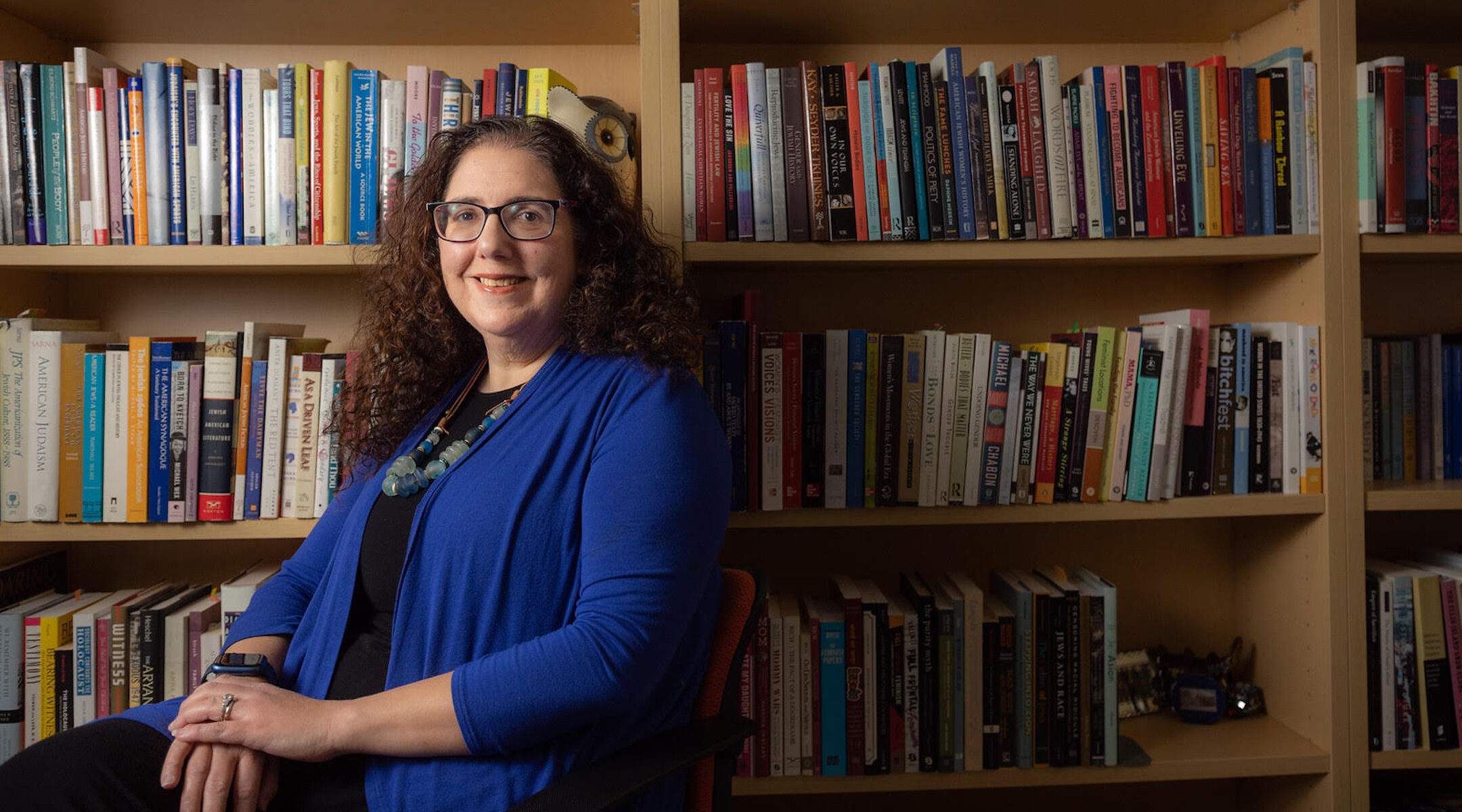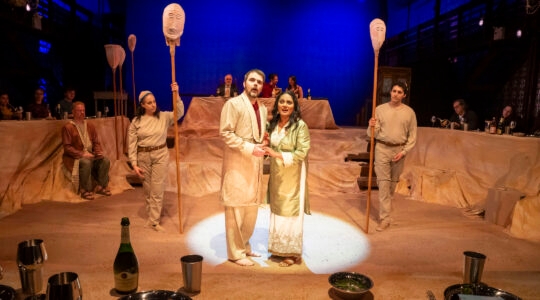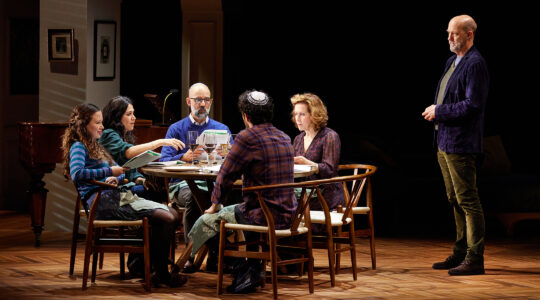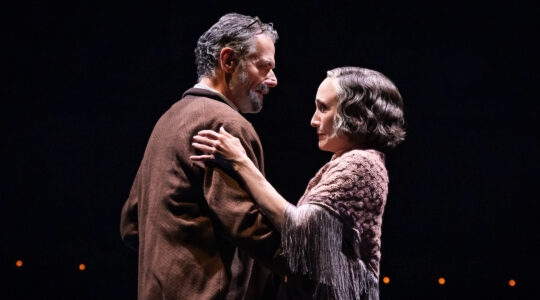(JTA) — It started innocuously enough.
A post from AITA, a Reddit channel that poses the question, “Am I the a–hole?” went viral on Twitter earlier this week when a Disney-loving woman claimed to have forsaken catering for her wedding guests in order to pay for a Mickey and Minnie Mouse appearance at the ceremony. (Reddit later removed the post, which many had suspected to be fake.)
Responses ranged from horror at the egregious wedding faux-pas to harsh critiques of “Disney adults,” or millennials who spend a considerable amount of their time and money visiting Disney’s theme parks, typically without children.
And then there was the response from Jodi Eichler-Levine, a Jewish professor of religious studies at Lehigh University. Eichler-Levine, who has written about the way Disney functions as a religion for some, urged against the criticism of adults who love Disney, arguing that much of the criticism of the Disney adult is overly simplistic and rooted in sexism.
“Many of the Disney fans I have observed in person and online find immense meaning in the parks. People don’t just marry at Disney. They mourn lost relatives at Disney. They go to Disney to celebrate surviving cancer. They go there for one last trip before they die,” Eichler-Levine wrote. “Religion is a way of making meaning in the world through stories and rituals.”
As her thread gained some traction, Eichler-Levine, who has also written extensively about Jewish imagery in media, from Maurice Sendak to “Hamilton,” faced mockery and criticism, including a deluge from Jewish Twitter users who found her 2020 essay drawing comparisons between the pandemic closure of Disney parks and the destruction of Judaism’s ancient Temples. She received so much scorn through direct messages that she made her account private for a day to stave off antisemitic and sexist harassment.
We spoke to Eichler-Levine about her scholarship, that Temple essay and her role at the center of the “Disney adult” discourse.
This conversation has been edited for length and clarity.
JTA: You became one of the most talked about people on Twitter this week, and you said you were the recipient of antisemitic harassment as a result. Tell me about that.
Eichler-Levine: I did not expect this Twitter thread to go viral. I didn’t think it said anything that revolutionary. I was just saying, hey, look, this is a site of real meaning for people. I’ve been studying Disney films since 2019. So have lots of other scholars. It really means something to people to get married in Disney World. It really is a ritual. And there’s people who orient their lives around it. So I would say Disney is at least quasi-religious, if not religious. And the reaction was dramatic.
Religious studies Twitter said this is an overly facile argument. Jewish Twitter, to the extent I saw it, seemed to be mad at the Revealer article and that comparison. The antisemites came out because I talked about capitalism. I mean, the antisemites came up because I’m Jewish, frankly. But I started getting a lot of retweets discussing the global Jewish conspiracy. I had pointed out that that religion is often intertwined with capitalism. This is something Weber talks about in terms of Protestant Christianity. But the ancient Temple was very holy; it was also a place for people to pay their farming taxes.
And so I think the fact that I talked about money, and I’m Jewish, and I do Jewish studies, led to the predictable Twitter antisemites — not a term I use lightly — kind of going bananas. I locked my account down and then reopened it when the fuss died down a bit. It was a deluge.
Other people were offended that I was taking on some kind of heresy, that there was something heretical in comparing Disney to a religion because real religions aren’t capitalistic, according to critics, and real religions are real.
But if you’re in religious studies, your job isn’t deciding if a religion is real or not. That’s a theological question. I don’t do that. I’m not a theologian, I’m not a rabbi. I say, ‘Okay, what practices and rituals are going on in the world that have meaning to people?’ And that doesn’t mean that Disney is or is not a religion. It means we understand it better through the lens of religion, and this kind of comparison.
You wrote about Disney as a stand-in for the Temple. What are the other parallels that you see between Disney and Judaism?
It’s interesting to think about both the parallels between Disney and Judaism and also the ways that Judaism is represented in and around the parks. So for example, when Disney does their special holidays around the world at Epcot, they have a Jewish storyteller singing Hanukkah songs and making Jewish food jokes. So there’s a way in which Disney’s new approach to multiculturalism has kind of grafted Jewish traditions that I think is fascinating, in terms of those structural similarities — like Disney being like a Temple, a site of pilgrimage. That’s the most obvious one, is this idea of a holy center, and anthropologists have been looking at Disney this way for decades, in fact. It’s not a new observation.
I think you’ve also got interesting comparisons when it comes to canon. Canon is relevant for a lot of different fandoms: Star Wars, which is now owned by Disney; Star Trek. And Disney has this sort of ever-evolving canon of films and characters that ends up commenting on itself in a very Midrashic way. The live-action remakes are kind of taking biblical stories and filling in new details and altering them for the times, just like what we saw in the evolution of the Talmud and rabbinic literature.
That reminds me of the 2007 Disney film “Enchanted,” which is a commentary on the whole of Disney itself and all of these ridiculous norms of the Disney universe.
“Enchanted” is a great example because it’s a meta movie. And very much like rabbinic literature, you have to know the signs to see them. You have to know the shots to say, ‘Oh, that looks just like a shot from Beauty and the Beast’ or ‘that camera angle is from the ballroom scene.’ It’s very much an insider language, which we see in a lot of religious traditions.
People tend to dismiss Disney. They dismiss it because it’s seen as “kid stuff” and because they think of it as fake. But even if the people in the costumes are fake, the emotions are real. So the intervention I was trying to make was to draw attention to the fact that this is real for some people. This is not just kid stuff, and it’s no different from people who weep when their sports team wins. I’m a Boston Red Sox fan. When they finally won the World Series in 2004, all of the reporting was on men in Boston who lived through the whole drought just weeping. And I’m not making fun of that. I thought it was very powerful. But we didn’t mock it the way we mock Disney adults.
There’s a gender component, too. When it comes to Disney as opposed to Marvel or Star Wars, there’s a larger number of women in the fan base. Princesses are symbolic of Disney, and they are girls. And so that idea of princess culture, of course, is problematic if we’re looking at girls’ agency — even Disney has realized that — but because of things like princess culture, Disney the brand got feminized. Part of the rise of Marvel and Star Wars is to defeminize the brand as a whole. But the actual word “Disney” for a lot of people still evokes women and children, and sometimes gay men. And all of those people are demonized by certain segments of U.S. society. There was a viral tweet last year mocking a woman who cried when she saw the castle. Because Disney fans are feminized and infantilized.
And at what point did you realize that things had snowballed, that this was going in a much bigger direction than you anticipated? And how do you think the fact that you are a woman and Jewish contributed to the harassment that you were getting?
I realized it when I started getting media inquiries. I’ve certainly written for the public a lot before, but it started to happen at an unusual rate. And then, to be honest, I have a job. I was also trying to work yesterday. But every time I checked in, things were kind of … people have gotten much more viral than this. It’s not that high a number, but I think that was a pretty clear indication.
It was a lot of men. There were plenty of women who were critical. I’m fine with intellectual criticism. But a lot of the “yo you’re stupid” comments and the threatening direct messages were almost universally coming from men. This is why a lot of people, including women, don’t want to engage on social media.
What were some of the valid intellectual criticisms you received, and how did you respond to them?
They got very lost in the deluge. But on academic Twitter, specifically on religious studies Twitter, there were lots of thoughtful criticisms. One of the best came from a scholar who pointed out very thoughtfully that when we say “don’t pathologize joy,” “don’t don’t mess with people’s joy,” “they’re having a good time,” he pointed out that they’re having a good time, but there’s also a lot of exploitation involved. Exploitation of their pocketbooks, exploitation of resources. I mean, Disney took over the Everglades in the 1970s. You can’t ignore the problems with Disney. There are racialized problems. There are a lot of problems with Disney. I didn’t want the thread to go on forever, but in my broader work, I’m certainly attending to that.
And also, religious studies Twitter kind of went, “well, I didn’t think this would be what made religious studies become the Twitter discourse, but here we are.” But it reinvigorated a lot of the debates that people thought were settled in the study of religion. Like the idea that there is no one normative thing that is religion. One of the things people have been discussing in religious studies since before I even went to grad school 20 years ago, is if religion is this capacious term, can you make it really capacious and apply it to anything that has rituals? Or does that dilute the term so much, that when we say “religion,” we really just mean “culture”?
People have also studied the fact that religion is a western concept. Jonathan Z. Smith famously wrote an essay about this. So did a lot of other scholars. It kind of reinvigorated a lot of those debates about what can we call a religion, how does religion connect with commerce — and when we’re talking about religion, if we describe something, are we validating it? Are we valorizing it? Because a lot of people took the tweet to mean, “she thinks that corporations are great” and saying you shouldn’t pathologize something means you shouldn’t criticize it.
But when I say, “don’t pathologize Disney fans,” I’m getting at this really gendered “These are hysterical fans,” or “these are strange adults who are interested in children,” which just reeks of homophobia, as well. So to pathologize something is to say it’s diseased, it’s the problem, we need to get rid of it, we need to cut it out.
I think it’s fine to criticize Disney fans or to criticize Disney as a company. But I’d like to see people using richer descriptions of what they criticize. And I think it’s fine to criticize Disney adults, maybe. But first we should understand.
There’s also a discourse critiquing the idea of the “guilty pleasure.” Because why should things that bring us pleasure make us feel ashamed or guilty? How does that apply to the furor over Disney adults?
This is not meant to be a knock at Christians, but I think it’s part of the unspoken Protestantism that is part of American culture. Even parts of the United States that we think are secular have this kind of Protestant overlay to them, where the ideas of guilt and sin are really profound. Now, that doesn’t mean there’s no guilt or sin in Jewish tradition. But humans’ original nature is not always thought of as sinful in Jewish tradition. You have this rabbinic idea of the “yetzer hatov,” the good inclination, and the “yetzer hara,” the bad inclination, sometimes translated as “evil.” But they’re both there. And if I may generalize, Jewish tradition can actually handle joy and play pretty well. The rabbis are very playful in the way they engage with one another.






